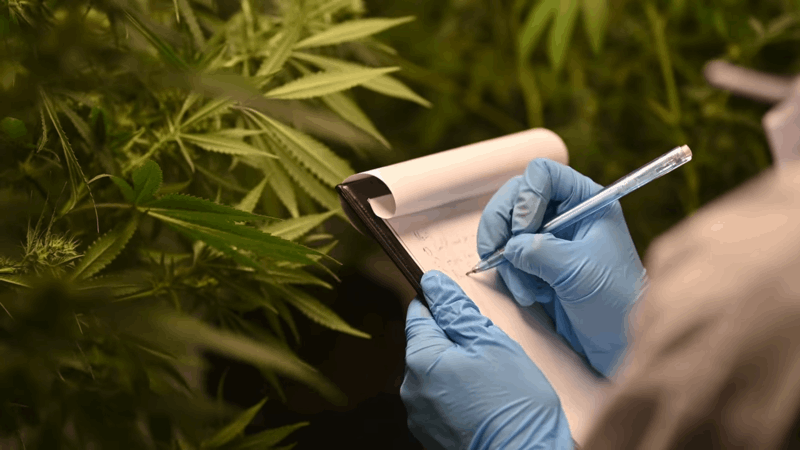No products in the cart.
As the popularity of CBD products for pets continues to rise, concerns about potential allergies in dogs have surfaced, prompting the question: Can dogs be allergic to CBD? Pet owners are eager to explore the benefits of CBD oil while ensuring their furry companions’ well-being.
In this blog, we delve into the intriguing question: Can dogs be allergic to CBD? We’ll shed light on the complexities of CBD allergies, explore the differences between allergies and sensitivities, and provide practical insights to help you make informed decisions about using CBD oil for dog.
Can Dogs be Allergic to CBD?

Dogs can potentially be allergic to CBD just like any other substance. Dogs can develop allergies when their immune systems react poorly to a particular allergen. CBD is thought to be safe for dogs and is used to treat a variety of medical ailments, however, exercising caution is so important when introducing any new supplement or medication into your dog’s routine.
To determine whether the symptoms are indeed due to an allergic reaction and to get the suitable plan treatment please consult with a veterinarian if you notice any adverse reactions or unusual behaviors after giving your dog CBD.
CBD Oil Allergy Symptoms
It’s important to note that true CBD allergies are relatively rare, but dogs can still experience adverse reactions to CBD oil or its components. Some potential symptoms of a CBD oil allergy in dogs may include:
- Skin irritation: This can manifest as redness, itching, hives, or rashes on the dog’s skin. They may scratch or lick themselves excessively.
- Digestive issues: Allergic reactions might lead to vomiting, diarrhea, or stomach upset in dogs.
- Respiratory problems: If dogs develop an allergic reaction to CBD and inhale or consume it, they may have coughing, sneezing, wheezing, or difficulty breathing.
- Swelling: An allergic reaction may be indicated by swelling of the cheeks, lips, or other body regions.
- Behavioral changes: Dogs might exhibit restlessness, anxiety, or agitation due to discomfort from an allergic reaction.
Stop using CBD oil and seek veterinary advice if your dog may be having an allergic response. The vet can properly diagnose the issue and recommend appropriate treatment or alternative options if needed. Keep in mind that these symptoms could also be caused by other factors unrelated to CBD allergy, so a professional diagnosis is crucial for proper management.
The Main Reasons Cause CBD Oil Allergies in Your Dogs
There isn’t much information on the precise causes of these allergies, however a few plausible causes could be to blame:
- Individual sensitivity: Dogs can have individual sensitivities to certain substances like humans. Some dogs might have a heightened immune response to specific components in CBD oil.
- Plant compounds: CBD oil is derived from hemp or cannabis plants. Some dogs might be allergic to certain plant compounds which are found in these plants, like terpenes or other cannabinoids present in trace amounts.
- Carrier oils or additives: CBD oil products often contain carrier oils (like coconut oil or hemp seed oil) and other additives. Dogs might be allergic to these carrier oils or other ingredients used in the product.
- Cross-reactivity: Dogs with allergies to other plants or substances might experience cross-reactivity with compounds found in CBD oil.
- Processing contaminants: Poorly processed or low-quality CBD oil might contain contaminants like molds, pesticides, or other allergens that trigger allergic reactions in dogs.
- Underlying health conditions: Dogs with impaired immune systems or pre-existing sensitivities may be more susceptible to developing allergies to numerous chemicals, including CBD oil.
- Dosage or frequency: In some cases, allergic reactions might be linked to the dosage or frequency of CBD oil administration. Dogs might develop an allergic response after repeated exposure to higher doses.
Although they are uncommon, allergies to CBD oil should be noted as a possibility. Stop using CBD oil right away and take your dog to the vet if you suspect an allergy. The vet can advise you on what to do after determining whether the symptoms are actually caused by an allergic response.
Can Being Allergic to CBD Kill a Dog?

Severe allergic reactions can be life-threatening in both humans and animals, however, deadly allergic reactions to CBD oil are incredibly rare in dogs. Most allergic reactions to CBD oil in dogs result in symptoms that can be managed with prompt medical attention.
A severe allergic reaction known as anaphylaxis can result in a sudden drop in blood pressure, breathing problems, and other severe symptoms. While anaphylaxis is a serious concern, it’s uncommon for dogs to experience this level of reaction to CBD oil.
It’s a good idea to introduce any new supplements or chemicals gradually and with a veterinarian’s supervision to reduce the danger of adverse reactions. Before giving your dog CBD oil, do not forget to get advice from your veterinarian. The vet can advise you on the best course of action based on your dog’s specific health and demands.
What to Do when Your Dog Has a CBD Oil Allergy?

To preserve your dogs’ safety and health, you must act quickly if you believe they are having an adverse response to CBD oil. Here’s what you should do:
- Discontinue use: Immediately stop giving your dog the CBD oil or any product containing CBD. This will prevent further exposure to the allergen and potentially worsening the reaction.
- Contact your veterinarian: Describe the symptoms you’ve observed and mention that you suspect an allergic reaction to CBD oil. Your veterinarian will advise you on the best course of treatment based on the severity of the symptoms.
- Observe your dog: Watch your dog’s condition closely while you await veterinary advice. Monitor their breathing, behavior, and any changes in their symptoms.
- Emergency care: Do not wait to seek emergency veterinarian care if your dog’s symptoms are severe or quickly getting worse. Signs of a severe reaction might include difficulty breathing, facial swelling, or extreme distress.
- Provide comfort: Keep your dog comfortable and calm. Minimize their exposure to potential allergens, and make sure they have access to fresh water.
- Allergen identification: If it is determined that your dog is allergic to CBD oil, consult your vet to determine which exact ingredients are to blame. You can prevent future exposure to comparable allergies with the aid of this knowledge.
- Consider alternatives: If your dog’s allergic reaction is severe or recurrent, your veterinarian might recommend avoiding CBD oil altogether or exploring alternative treatments for your dog’s condition.
Never forget that consulting your veterinarians is very important. They are qualified to identify the problem, recommend appropriate treatment, and guarantee your dog’s health.
CBD Dog Allergies: Can It be Treated Completely?
CBD oil allergies in dogs can vary in severity, and whether they can be completely treated depends on several factors. Here are a few considerations:
- Identifying the allergen: If it’s determined that your dog is allergic to a component of CBD oil or an additive in the product, complete avoidance of that specific allergen is the key to preventing further allergic reactions.
- Avoidance: Once the allergen is identified, complete avoidance is generally the most effective way to prevent allergic reactions. This means not using CBD oil or any products that contain the allergen.
- Alternative treatments: If CBD oil was being used to manage a specific health condition, you might need to explore alternative treatment options that do not trigger an allergic reaction.
- Gradual introduction: It might be possible to reintroduce CBD oil in very small amounts and gradually increase the dosage with the guidance of a veterinarian. This approach is employed to ascertain whether the dog’s sensitivity to the allergen has altered over time. However, this approach should only be done under professional supervision.
- Medications: For mild to moderate allergic reactions, your veterinarian might recommend medications to alleviate symptoms.
- Emergency plan: Your veterinarian may recommend an emergency drug if your dog has previously had a serious allergic response.
It’s crucial to remember that while avoidance is frequently the main tactic for treating allergies, there is no certain “cure” for them. Instead, the focus is on preventing exposure to the allergen and managing symptoms when they occur. To develop a comprehensive plan for managing your dogs’ allergies and ensuring their overall health, working closely with your veterinarian is so important.
Considerations when Giving Dogs CBD Oil
If you’re considering giving your dog CBD oil to potentially avoid allergic reactions, there are several important considerations to keep in mind:
- Consult a veterinarian: Before introducing any new supplement or product to your dog’s routine, consult your veterinarian. They can provide guidance based on your dog’s health, individual needs, and any potential risk factors.
- Choose high-quality products: Choose safe and high-quality CBD oil products from reputable manufacturers. Look for products that provide clear information including the source of the CBD, the extraction process, and third-party testing for purity and potency.
- Start with a low dose: When introducing CBD oil, start with a low dose and observe your dog’s response. This can help you identify any adverse reactions early on and adjust the dosage if necessary.
- Read labels carefully: Check the ingredient list for any potential allergens. Some CBD products contain carrier oils or additives that might trigger allergic reactions in sensitive dogs.
- Single-ingredient products: If you’re concerned about potential allergens, consider using CBD isolates or products with minimal ingredients. This reduces the likelihood of exposure to allergens.
- Monitor for reactions: Keep a close eye on your dog after administering CBD oil. Watch for any signs of allergic reactions like skin irritation, digestive issues, or changes in behavior.
- Rotate brands: If you’re using CBD oil regularly, consider rotating between different reputable brands. The risk of sensitization to specific ingredients over time can be reduced by this.
- Avoid synthetic additives: Choose CBD oil products that are free from artificial flavors, colors, and other synthetic additives. These additives could potentially trigger allergic reactions.
- Observe long-term effects: Monitor your dog’s health and well-being carefully when CBD oil is used for an extended period. While rare, sensitivities or allergies could develop over time.
Remember that while the risk of CBD oil allergies in dogs is relatively low, individual dogs can react differently. Being cautious, informed, and working closely with your veterinarian can help ensure a positive experience and minimize the potential for allergic reactions.
CBD Oil Allergy vs. Sensitivity: Key Differences Explained

CBD oil usage for pets is on the rise, but concerns about potential allergies and sensitivities have arisen. Understanding the differences between CBD oil allergies and sensitivities is crucial for responsible pet care.
| Aspect | CBD Oil Allergy | CBD Sensitivity |
| Definition | Immune system response to specific CBD components. | Mild, non-immune reactions to CBD or its components. |
| Cause | Allergic reactions triggered by an immune response. | Non-immune reactions due to digestive or metabolic factors. |
| Symptoms | Skin irritation, hives, vomiting, diarrhea, etc. | Mild stomach upset, changes in appetite, slight discomfort. |
| Severity | Can range from mild to severe, including anaphylaxis. | Usually mild and rarely life-threatening. |
| Onset | Rapid onset after exposure to CBD oil. | Gradual onset, might take time to develop. |
| Duration | Symptoms persist as long as exposure continues. | Symptoms resolve once CBD is eliminated from the diet. |
| Mechanism | Immune system releases histamines and antibodies. | Non-immune reactions related to digestion/metabolism. |
| Treatment | Requires avoidance of CBD oil and allergen. | Discontinuing CBD use usually resolves symptoms. |
| Medical Attention | Often requires veterinary care and treatment. | Usually not as urgent, but consult a vet if needed. |
| Risk Factors | Typically seen in dogs with existing allergies. | Can occur in any dog, particularly with high doses. |
| Prevention | Identifying allergen, avoiding exposure is key. | Monitoring dosages, introducing CBD gradually. |
| Cross-Reactivity Risk | Potential cross-reaction with other allergens. | Minimal risk of cross-reaction with other allergens. |
Understanding whether your dog is experiencing an allergy or a sensitivity to CBD oil is crucial for appropriate management. To determine the issue and provide proper care for your pets, consulting a veterinarian is necessary if you suspect any adverse reactions.
Conclusion
The question “Can dogs be allergic to CBD” prompts essential considerations for responsible pet owners. While true allergies to CBD are rare, some dogs might exhibit sensitivities or reactions to specific components in CBD products.
To ensure your dog’s safety, it’s advisable to introduce CBD gradually, choose high-quality products, and closely monitor for any signs of allergies. As always, consulting with a veterinarian before incorporating CBD into your dog’s routine is essential for informed and responsible pet care.
Hello, I am Hazel Bennett, an experienced copywriter specializing in the fascinating topic of CBD for dogs. With a passion for pet wellness and extensive knowledge of CBD’s potential benefits, I am here to provide you with informative and engaging content.



